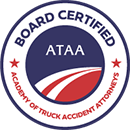How Often Do Truckers Drive While Distracted?
With April as Distracted Driving Awareness Month, we want to tackle the tough topic of distracted driving. While on the road, many people text on the phone or adjust the radio. But did you know those actions can lead to serious injuries?
According to the Centers for Disease Control and Prevention, about 3,000 people are killed and 424,000 injured in crashes involving distracted drivers every year. Distracted driving is a serious concern with any vehicle on the road. But when you add the size and weight of a large commercial vehicle, it can lead to disastrous consequences.
At the Trucking Injury Law Group, many of our clients have suffered the physical, emotional, and financial impact of a distracted truck driver operating a vehicle. While we would like to put everyone’s mind at ease, texting, talking, and even eating are all distractions that can lead to accidents.
Unfortunately, this problem seems to persist on our roadways and highways.
How often do truckers drive while distracted? Let’s look at the facts on the road:
Distractions on the Road
Truckers face several risks while on the road, including distractions. Many of these distractions fall into three categories: cognitive, visual, or manual.
Cognitive distractions happen when the driver is looking at the road, but their mind might be “daydreaming.” Long hours of driving without proper rest can lead to fatigue. In turn, that can cause a lack of attention, decreased reaction times, and cause the driver to put their focus on somewhere other than the road.
Visual distractions are the most common distractions faced by truckers, and they often stem from mobile phone use. While hands-free options are allowed, improper use of mobile phones puts everyone at risk. Dialing, answering calls, or texting can divert attention from the road.
Research from the FMCSA shows that commercial motor vehicle drivers who text are 23 times more likely to be involved in a truck accident than those who do not.
Drivers who dialed a handheld phone had more frequent and larger steering corrections than drivers who were only talking on the phone. While dispatching devices may seem pretty innocuous, drivers who used them were nine times more likely to be involved in a crash.
Finally, manual distractions can include activities that make the driver take their hands off the wheel. These prohibited behaviors can involve adjusting the radio, eating, and even taking photos.
While some distractions are unavoidable, minimizing them helps to make everyone safe on the road.
Federal Motor Carrier Safety Administration (FMCSA) Regulations
The FMCSA defines distracted driving as “no reaching, no holding, no dialing, no texting, and no reading.” According to the new FMCSA rules for interstate travel, truck drivers are prohibited from texting or using handheld mobile phones while operating a commercial motor vehicle. Drivers caught violating these rules face fines, disqualifications, and being put out of service.
Using any device that requires the driver to take their eyes off the road, even for a second, is considered a violation.
The regulations go as far as to say that reading from an electronic device or texting in a code is also a violation of these rules. While hands-free devices are permitted for use, they still must not divert the truck driver’s attention from the road.
Truck drivers who are distracted while driving face fines of up to $2,750. Repeat offenders face even harsher consequences, such as being disqualified or put out of service for up to 120 days.
Also, the driver’s employer can be fined up to $11,000 if they knowingly allow or require drivers to use handheld devices while driving. This violation will negatively affect the employer’s SMS (Safety Measurement System) ratings, leading to more consequences.
How many of today’s truck drivers engage in these activities?
Truckers are not freely answering these questions since they know they could face the consequences of losing their livelihood, monetary fines, and even civil penalties. It is not until an accident occurs on the road that law enforcement and accident investigators discover the true source of the crash: distracted driving.
Safety First
Safety is important when it comes to driving, especially for truckers who spend long hours on the road. To reduce distracted driving incidents, truckers need to follow certain safety practices.
First, using hands-free devices for calls and navigation can reduce the likelihood of accidents caused by distracted driving. Plus, it is mandated by FMCSA rules. All drivers should take these devices out of easy reach and avoid reaching or holding them while driving.
Prioritizing rest breaks and meals is another vital step. Fatigue contributes to distraction. When truck drivers get the proper amount of sleep and take scheduled breaks, they can prevent any occurrences where their mind drifts away from the road.
Also, multitasking while driving should be avoided at all costs. Truckers need to focus solely on driving. They should always avoid eating, adjusting the radio, or engaging in other activities while behind the wheel. With that, they can minimize distractions and increase their focus on the road.
Finally, truckers should be aware of FMCSA regulations and always comply with them. Ignorance is not an excuse.
Driving a large commercial vehicle is a significant responsibility. And for those who can’t follow the rules, it can lead to a revocation of their operating license and a loss of employment.
All truck drivers need to stay focused and avoid distractions while on the road to ensure their safety and the safety of others. By following the rules and regulations set forth by the FMCSA, we can all work together to make our roads safer.






